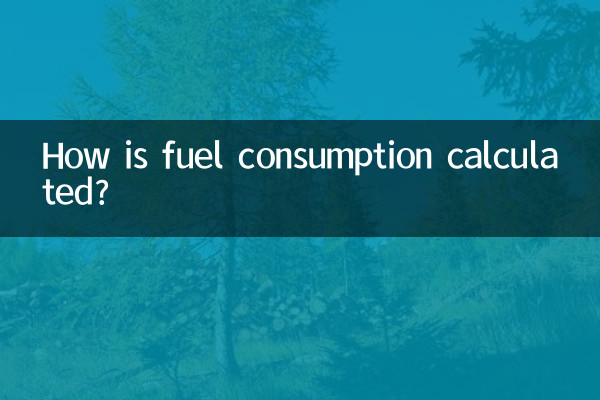How is fuel consumption calculated?
With the fluctuation of oil prices, more and more car owners are beginning to pay attention to the fuel consumption of their vehicles. How to accurately calculate fuel consumption? What factors affect fuel consumption? This article will give you a detailed answer and attach structured data for reference.
1. Calculation method of fuel consumption

Fuel consumption is usually based on"L/100km" (L/100km)Expressed in units, the calculation formula is as follows:
Fuel consumption = (refueling amount ÷ mileage) × 100
For example: if you add 30 liters of oil and drive 500 kilometers, the fuel consumption is (30 ÷ 500) × 100 = 6L/100km.
2. Main factors affecting fuel consumption
Fuel consumption is affected by many factors. The following are common factors and data comparisons:
| Influencing factors | Fuel consumption range | illustrate |
|---|---|---|
| driving habits | ±10%-20% | Rapid acceleration and braking will increase fuel consumption |
| speed | 60-90km/h is the most fuel-efficient | Fuel consumption increases significantly over 100km/h |
| vehicle load | Approximately 5% increase for every additional 100kg | Long-term stacking of heavy objects in the trunk affects fuel consumption |
| tire pressure | 10% lower than the standard value increases fuel consumption by 2% | It is recommended to check tire pressure once a month |
| Air conditioning use | Increase fuel consumption by 10%-20% | The impact is more obvious when driving in urban areas |
3. Fuel consumption reference data of different models
The following are the official fuel consumption data (NEDC standards) of mainstream models:
| Vehicle type | Representative models | Comprehensive fuel consumption (L/100km) |
|---|---|---|
| small car | honda fit | 5.3-5.7 |
| compact car | Toyota Corolla | 5.1-5.9 |
| Medium SUV | HondaCR-V | 6.4-7.3 |
| limousine | BMW 5 Series | 6.5-7.2 |
| New energy hybrid | Toyota Prius | 3.7-4.0 |
4. Practical tips for reducing fuel consumption
1.Keep driving at a constant speed: Try to maintain an economical speed of 60-90km/h
2.Reduce idling time: It is recommended to turn off the engine when parking for a long time.
3.Proper use of air conditioning: Open the windows at low speeds and turn on the air conditioner at high speeds to save fuel.
4.Regular maintenance: Replace air filter, spark plug, etc.
5.Plan a route: Avoiding congested road sections can significantly reduce fuel consumption
5. Misunderstandings in fuel consumption calculation
1.Single calculation result is inaccurate: It is recommended to record the refueling data 3-5 times and take the average value.
2.Ignore fuel gauge errors: The automatic jumping time of the oil gun may be different in different gas stations.
3.Ignore temperature effects: Fuel consumption in winter is usually 10%-20% higher than in summer.
4.New car running-in period: Fuel consumption may be high in the first 3,000 kilometers, which is normal.
6. Recommended fuel consumption calculation tools
1.Mobile APP: Bear Fuel Consumption, Fuel Consumption Pass, etc.
2.car computer: Most new cars are equipped with real-time fuel consumption display function
3.Excel table: Manually record refueling data and calculate
Through the above methods and data, I believe you have mastered the essentials of fuel consumption calculation. Reasonable driving can not only save fuel expenses, but also reduce exhaust emissions and contribute to environmental protection.

check the details

check the details